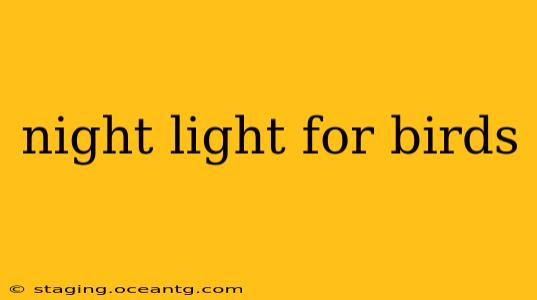Birds, especially those kept as pets or in aviaries, often benefit from a night light. But choosing the right one requires understanding their specific needs and potential drawbacks. This comprehensive guide explores the various aspects of using night lights for birds, addressing common concerns and offering informed advice.
Why Use a Night Light for Birds?
Many bird owners utilize night lights to provide a sense of security and comfort for their feathered friends, particularly during periods of darkness or stress. A dimly lit environment can reduce anxiety, especially in newly acquired birds or those prone to nighttime fear. Some birds are also more active at night and a faint light can allow owners to better observe their behaviour. However, it’s crucial to remember that the purpose is to provide minimal light, not to illuminate the cage brightly.
What Kind of Night Light is Best for Birds?
The ideal night light for birds is one that emits low-level, red or amber light. These wavelengths are less disruptive to a bird's natural sleep cycle than brighter, bluer lights. Avoid blue, green, or white lights, as these can interfere with melatonin production and disrupt their circadian rhythm, leading to health problems.
Here's what to look for:
- Low wattage: Aim for a bulb that produces less than 5 watts.
- Dimmable: The ability to adjust the brightness allows for fine-tuning to suit your bird's individual needs.
- Safe enclosure: Ensure the bulb is securely enclosed to prevent your bird from touching it and getting burned or electrocuted.
- Heat output: Choose a bulb that doesn't generate excessive heat, as this can be uncomfortable and even dangerous for your bird.
- Red or Amber: These colors are less likely to interfere with your bird's sleep patterns.
How Bright Should the Night Light Be?
The goal is to provide just enough light to make the cage area slightly visible, not to illuminate the room brightly. Think of it as a very dim glow, similar to moonlight. You should be able to easily see your bird, but it shouldn't be so bright as to be stimulating. Experiment with different brightness levels to find what works best for your bird.
Are Night Lights Necessary for All Birds?
No, not all birds require night lights. Many species adapt perfectly well to the natural darkness of nighttime. However, certain birds may benefit from the added security and comfort of a dim night light. Factors to consider include the bird’s species, age, temperament, and whether it's in a new environment.
Can Night Lights Harm My Bird?
While used correctly, night lights pose little risk. However, improper use can lead to problems:
- Disrupted sleep cycles: Too bright or the wrong color light can interfere with their sleep patterns, leading to stress, lethargy, and health issues.
- Electrocution or burns: Poorly secured bulbs pose a risk of electrocution or burns.
- Eye damage: Although unlikely with low-wattage lights, prolonged exposure to bright light could potentially harm a bird's eyes.
What if My Bird Seems Disturbed by the Night Light?
If your bird appears anxious, restless, or doesn’t seem to settle down with the night light, remove it immediately. Every bird is an individual, and some might be more sensitive to even dim light than others.
How to Introduce a Night Light to Your Bird
Introduce the night light gradually. Start with it on for a short period, observing your bird's behavior. Gradually increase the duration if your bird seems comfortable. Always prioritize their well-being and adjust accordingly.
Are there alternatives to night lights?
Some bird owners prefer to use a motion-activated light that only turns on if the bird is active at night. Others simply let their birds experience the natural cycle of darkness, finding that this is sufficient for their needs.
This information serves as a guideline. Always consult with an avian veterinarian for advice specific to your bird’s species and health condition before introducing a night light or making significant changes to their environment. Prioritizing the well-being and comfort of your bird should always be paramount.
